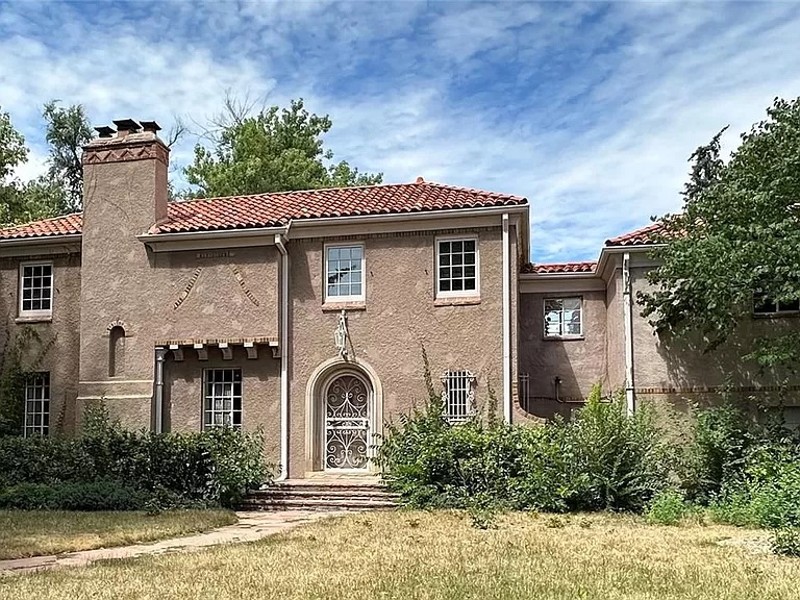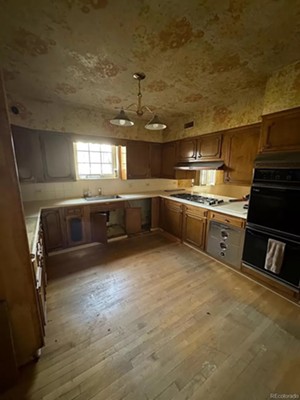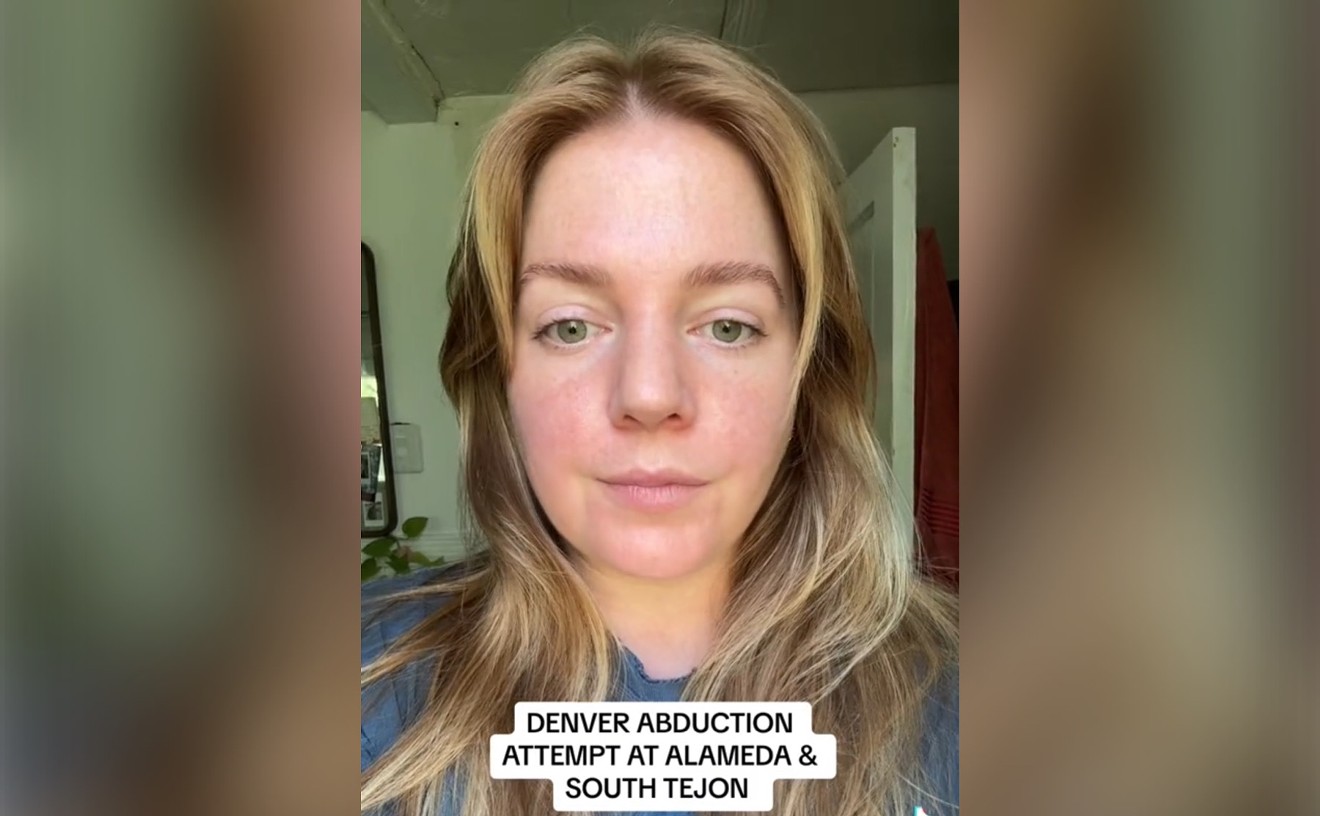A Park Hill home built in 1934 at 5013 East Montview Boulevard won’t be declared a landmark after all. After a months-long fight, the Denver Landmark Preservation Commission voted unanimously on January 23 to deny the landmark designation application filed against the owner’s wishes, saying it hadn’t met the necessary criteria.
“While we are relieved at the outcome, we are disappointed that the city allowed three individuals with no connection to the property to subject our family to such stress and financial hardship over the past four months," says Mark Rinehart, who bought the house in 2022 through a trust with his wife, Marianne.
The Rineharts had hoped to demolish the house and build a forever home on the choice lot. When their demolition company applied for permits last September, though, Denver Landmark Preservation flagged the property as one that could be eligible for preservation. Two months later, three nearby residents filed for landmark designation.
The applicants and the Rineharts attempted to negotiate, as required by city law. But Rinehart says the mediation process was frustrating because the people who wanted to see the property designated a landmark weren’t clear on what would make them withdraw their application. And the city wasn't clear on the process, either.
“We kept asking, ‘Well, what do you guys want?’ They wouldn't tell us,” Rinehart says. “We asked, ‘What if we come to an agreement with these three people? Is the process done?’ And they said, ‘Well, no, because three other random people could file an application at any point.’ So you're spinning your wheels mediating with these people who ultimately might not be the decision-makers.”
Eventually, the Rineharts realized that the applicants would only be pleased if they preserved the entire shell of the home, so they put the property up for sale in hopes of finding a preservation-minded buyer; they say they didn’t have the “bandwidth” to redo all their plans and switch from a new build to a historic remodel. When no buyer emerged before January 23, the matter went to the commission.
“It is honestly impossible to articulate just how terrible the experience has been,” Marianne Rinehart said during the hearing. “We are not developers, but a family wanting to build our forever home in a neighborhood where we have lived for over ten years.”
But in the end, the Landmark Preservation Commission determined the house didn't fit the criteria for historic designation, anyway. According to the application, it matched four criteria for designation: having a direct and substantial association to a recognized person or group with influence on society; embodying distinctive visible characteristics of an architectural style; being a significant example of the work of a master builder; and an established and familiar feature of the Park Hill neighborhood.
City staffers had originally found that the property met the architectural style and familiar feature of the neighborhood characteristics, but not the other two. The commission determined it only met one, for its Italianate style.
According to Abigail Christman, principal city planner for Landmark Preservation, the application did not do enough to connect the property to a recognized person or master builder. Theater mogul Harry Huffman was the first resident of the home, but he only lived there for four years while he had his much more famous Shangri-La mansion built; the city determined that the application didn't connect the Montview property to his career.
“Our application focused on detailing all the inhabitants of 5013 because the legacy and fame of Harry Huffman was previously confirmed by landmark staff when it was most recently used as a qualifying criterion to establish the Bluebird Theater as a Denver landmark,” explained Margaret McRoberts, one of the three applicants who spoke at the hearing.
McRoberts and fellow applicants Trish Leary and Bernadette Kelly believed the previous evidence should have been enough to show Huffman’s significance, McRoberts added. But according to Christman, the commission and city can only consider evidence that is actually in the application.
For the master builder criteria, the applicants didn’t add context about Douglas M. Sugg, who built high-end dwellings in Denver from 1920 to 1950 and constructed this home, so the city was not able to determine if Sugg should even be considered a master builder — much less if the Park Hill home is a significant example of his work.
Finally, though the city originally agreed the building was a significant feature of the Park Hill neighborhood, the commission ended up adding that criterion to the list of items not met by the application.
During public comment, residents of the neighborhood testified they had not noticed the property during their time living nearby.
“The only thing established about the property is that it's in disrepair,” said Rachel Greiman. “I've talked about this situation often over the last six months with other people and friends who live in Park Hill. When I try to explain the circumstance about what's happening to other Park Hill friends, the only way to orient them to the address is to say that I'm talking about the really rundown house on the corner of Elm and Montview.”
Still, the three who filed the application said they feel that Park Hill is rapidly losing its historic character and want to preserve more of it; just ten properties in the area are designated historic and there are historic corridors on Montview and 17th Avenue Parkway. Before the meeting, 21 comments for the designation and 70 against it had been submitted to the commission; most public comments at the meeting were in opposition to the designation, though a few speakers said they supported it.
While some commission members said they agree that it is important to preserve Park Hill’s history, they also recognized that the application did not show why this home in particular deserved landmark status.
Rinehart feels better now that the process is over, but says he is still shocked that it was so easy for his family’s plans to be disrupted.
“Throughout the whole process, most people have been blown away by what we've had to go through,” he says. “Before this, we didn't know that this process existed within the city — and I think that the average person has no clue, either.”
He suggests that Denver needs to inform people much earlier in the construction-permit process that this could happen; he and Marianne had been working with the city for months before they learned that their home could be flagged for landmark status when they applied for their demolition permit.
“I could give about five hours' worth of suggestions on the process,” Rinehart says. “My general thought on this is that there needs to be a much higher bar for an application to be filed against a homeowner's wishes. There's only an $875 fee that has to be paid.”
Those who own properties and want them to be designated as historic only pay a $250 application fee. Since 2012, the $875 fee has applied to applications by non-owners — in part to create a higher hurdle for hostile designations. There have been other changes to the process since then, including Denver City Council's 2022 rule that gives the owner more speaking time during the hearing process.
That helped, Rinehart says, but he thinks more could be done. The mediation process was not a viable way to reach a solution, he suggests, and he also points out that three people can easily split the $875 fee or crowdfund it and spend even less to file an ultimately futile application, delaying construction for months. Considering the financial and emotional toll the non-owner application put on his family, he believes the fee should be much higher — even $5,000 to $10,000 — to ensure that other homeowners aren’t subjected to the same pain.
“It's just such a bizarre process,” Rinehart concludes.
[
{
"name": "Air - MediumRectangle - Inline Content - Mobile Display Size",
"component": "12017618",
"insertPoint": "2",
"requiredCountToDisplay": "2",
"watchElement": ".fdn-content-body",
"astAdList": [
{
"adType": "rectangle",
"displayTargets": "mobile"
}
]
},{
"name": "Editor Picks",
"component": "17242653",
"insertPoint": "4",
"requiredCountToDisplay": "1",
"watchElement": ".fdn-content-body",
"astAdList": [
{
"adType": "rectangle",
"displayTargets": "desktop|tablet"
},{
"adType": "rectangle",
"displayTargets": "desktop|tablet|mobile"
}
]
},{
"name": "Inline Links",
"component": "18838239",
"insertPoint": "8th",
"startingPoint": 8,
"requiredCountToDisplay": "7",
"maxInsertions": 25
},{
"name": "Air - MediumRectangle - Combo - Inline Content",
"component": "17261320",
"insertPoint": "8th",
"startingPoint": 8,
"requiredCountToDisplay": "7",
"maxInsertions": 25,
"watchElement": ".fdn-content-body",
"astAdList": [
{
"adType": "rectangle",
"displayTargets": "desktop|tablet"
},{
"adType": "rectangle",
"displayTargets": "desktop|tablet|mobile"
}
]
},{
"name": "Inline Links",
"component": "18838239",
"insertPoint": "8th",
"startingPoint": 12,
"requiredCountToDisplay": "11",
"maxInsertions": 25
},{
"name": "Air - Leaderboard Tower - Combo - Inline Content",
"component": "17261321",
"insertPoint": "8th",
"startingPoint": 12,
"requiredCountToDisplay": "11",
"maxInsertions": 25,
"watchElement": ".fdn-content-body",
"astAdList": [
{
"adType": "leaderboardInlineContent",
"displayTargets": "desktop|tablet"
},{
"adType": "tower",
"displayTargets": "mobile"
}
]
}
]












